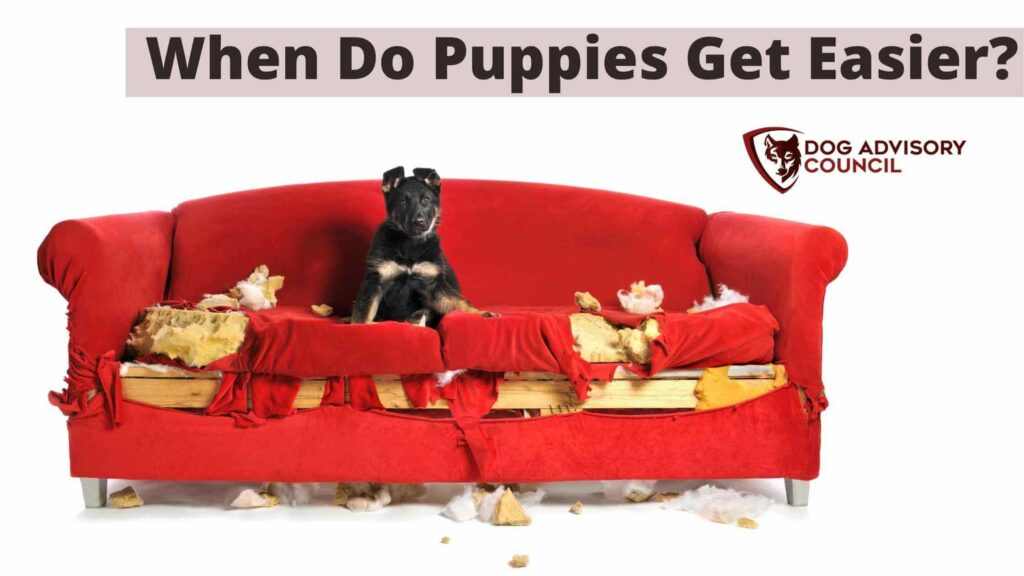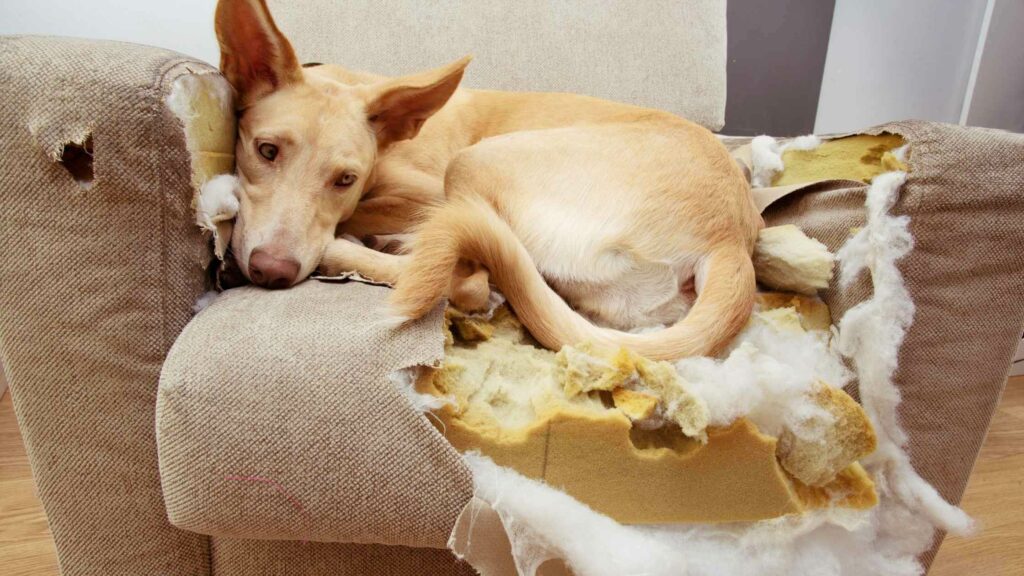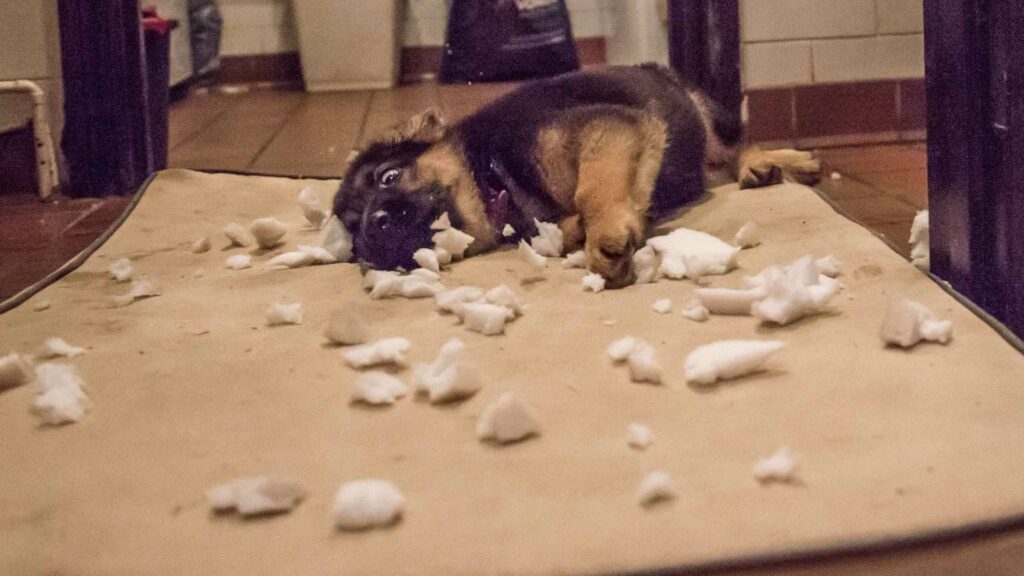
You love your puppy, no question. But if you find yourself wondering when do puppies get easier and, if ever, it’s going to get easier, you’re in just the right place! Scroll on for this very relatable question.
Puppies will start to get easier to care for once they are between 4-5 months of age. At this point, they’ve settled properly into your home and your routines. They’ve met your other pets, and everyone is starting to settle into their new lives. At this age, most puppies are reliably house-trained, too, and start to listen to basic obedience commands. This helps make the entire process of life with your puppy much easier.
How long until my puppy gets easier?
No matter how much you love your puppy, generally speaking, we’ll all get to that point where we just need to know how much longer our puppies will be little demons. Most experts will tell you that puppies will start to even out and become our cute little puppies again when they reach 6 months of age.
By this time, they’ve gone through their various rebellion stages, and you’ll also have adjusted enough to know exactly what you’re dealing with. You’ll find it easier all around.
At what age are puppies the most difficult?
If you’re starting to feel some puppy blues and want to know what you can expect as far as difficulty, the worst will be when your puppies are between 2-6 months of age.
Do puppies get better as they get older?
It’s nice to think that puppies will get better behaved with each month of age, but it isn’t always that simple. Puppies can regress to old habits and behaviors even as they age, especially as they get into the 5-6 month zone. You’ll need to be consistent and diligent in your training and general control; otherwise, your puppy will cause much more frustration and possibly the need to retrain behaviors!
You’ll be happy to know that this regression is temporary, and you can consider it your “final push” into the better times to come. When your puppy sees that you aren’t going to give in and let them do whatever they want, you’ll find that they’ll simply give in and start becoming the puppy that you know and love.
Sometimes puppy regression is also due to dealing with different life milestones, such as teething and socialization. All the more reason to try and stay strong and focus on consistency.
Are puppies easier at 6 months?
Once your puppy reaches 6 months, they’ve gone through their various rebellious stages. These stages are:
- Bathroom training
- Teething
- Boundary testing
Bathroom training is the first one that often takes over your puppy’s second and third months of life as you train them. This is difficult as you adjust to having a new furry household member and trying to take care of them while ensuring that they don’t pee on your couch.
Teething happens around 4-5 months of age. This is when you’ll notice puppies starting to get very bite-crazy, chomping away on everything they can to help curb the tooth pain they’re feeling. This causes them to regress and even ignore commands for “stop” or “no,” etc. You’ll want to focus on giving them teething toys to help with this.
Boundary testing happens between months 5-6. This is when your puppy will see just how serious you are about the rules and commands you’ve been giving them. You’ll need to hold your ground here and be firm about enforcing those boundaries so that you can get through this short-lived rebellion as quickly and easily as possible.
Throughout all these stages, you’ll need to stay focused on your various training so that your dog sees consistency all the way through. This will also help you to keep your sanity as you navigate this frustrating time.
Is the first year the hardest with a puppy?
Yes, the first year of your puppy’s life will often be the hardest one since you have to teach them everything, and they will often push your limits and patience with their seemingly endless energy.
Senior years can also be challenging for pet owners, which is often about navigating medical changes.

How do you survive a puppy in its first year?
A bit dramatic but totally understandable when you’re living this reality daily and looking for some help. If you want to get through it as easily as possible, put these tips to work:
- Prepare your home, family, and self before your puppy arrives
- Be preventative, not reactive
- Start obedience training ASAP
- Bring in help
Prepare your home, family, and self before your puppy arrives
Just like you’d prepare before your baby arrives, you’ll need to prepare before your puppy arrives! This includes puppy-proofing, making sure everyone in the household understands the changes to come and getting lots of rest and relaxation so that you’ll be ready for the first few weeks and months of your furry addition.
Be preventative, not reactive
In this case, we’re talking about your expectations and overall attitude. You’ll need to assume that your puppy will get into everything and on every last nerve you have. Work to prevent that as much as possible for as long as possible. This will help you to sail through some of the easier things!
Start obedience training ASAP
Obedience training will help your smart and eager puppy learn some basics beforehand. The earlier you start this, the better prepared your puppy will be, so they’ll start listening to the commands much better. This can also help them see their role in the family, which helps them adjust and settle in easier.
Bring in help
Help is going to be essential when things get hard! It could be a loved one in your household, or it could be someone who also has a puppy — like a play date. Get support and help so that you are not alone in dealing with these puppy behaviors by yourself.
This could also extend to professional help if you need it. A pet trainer or another specialist will help you get through some of the harder parts of living with a puppy. They can also offer perspective, so you don’t feel alone in dealing with everything.
Why are puppies so stressful?
Puppies are stressful because they are babies, and you must do everything for them and with them. Their very survival depends on you, just like a human baby’s survival would be. Puppies don’t understand human rules or norms, so what seems logical to us is going to be nonsensical to them, and vice versa!
What to do when your puppy is driving you crazy?
If your puppy is driving you crazy, you’ll need to work hard to control yourself. After all, they aren’t doing it on purpose (usually), and you must remember that yelling at your puppy can make things worse than they are now. If you are feeling almost out of your mind, here are some things to help you through:
- Take a deep breath and remember it won’t last forever
- Stick to your obedience commands
- Have someone relieve you of puppy duty regularly
- Consider puppy socialization classes
- Consider a puppy play date
Consistency is key with training and approach. This is why it’s mentioned here. The first tip is more to help you remember that this won’t last forever, and you’ll be perfectly fine once your puppy gets through these challenging stages. If you regularly get a break from puppy care, it can help you keep things in perspective and show you how you will be okay when it comes to enjoying your puppy’s first year.
Even if it seems impossible, you will survive your puppy’s first year and move on to many happy and loving years to come. You just need to keep it all in perspective.
The socialization and play dates will give you tools to help you succeed with your puppy and connect you with other new pet parents who can relate to what you’re going through. This can be a really effective way to help you, which we’ll discuss below.

Tips to get through the puppy stage
Getting through this puppy stage will be as much about taking care of yourself as the puppy’s prime caretaker as it will be about the puppy! Yes, really. Tips to help include:
- Letting others share in puppy caring
- Joining support groups or doing playdates
- Take it day by day
- Always find the positive milestones
Unless you are the only one in your household, let someone else take on your puppy’s caring whenever possible. Your puppy will have no difficulty with it if you all use the same techniques and commands. It also means that not everything will land on you, which is essential for giving yourself a break from puppy burnout.
Joining support groups or doing play dates
If you can, join a support group (in-person or online) and also look at setting up playdates for those that are also new pet parents. It will help you all to see that you’re not alone. You can talk, vent, share funny stories, and even share tips and suggestions. It helps keep yourself in perspective, too, and remember that a whole world exists.
Don’t be afraid to check out blogs and websites dedicated to puppy care. There is a lot of information that can help and calm you. You just need to know where to look for it.
Take it day by day
When you are going through these rough stages, whatever one that you are in, take it day by day. No longer and no shorter. This will help you just plug along on hard days and remember that you’ll get through it. Before you know it, you’ll be past the 6-month mark and feeling success right around the corner!
Always find the positive milestones
It’s easy to fixate on what your puppy is doing wrong when they are driving you crazy, and you’re stressed out, but you’ll want to try to find the positive milestones so that you can see what progress they have made, and are making, even on those tough days. It’s going to take the edge off the exasperation you’re feeling and help you see that it’s not all bad!
Do puppies calm down when you can walk them?
Yes, puppies can calm down a lot if you walk them and otherwise exercise them as you should. This will help them work out that energy and give them less time to get into trouble and otherwise cause frustration and general chaos. Exercise and playtime will work wonders if you need to get your puppy’s energy out!
What is the hardest part of having a puppy?
Typically, bathroom training will be the hardest part of having the puppy, but many find teething and boundary testing difficult, too. It depends on which stage takes the longest to get through and which depends on your time and energy.
Some puppy pros will tell you that obedience training is the hardest part of having a puppy, but since it encompasses everything we’ve discussed, it does make sense why!
In conclusion
Puppies are hard to take care of for the first 6 months of their life. After this, they’ll be successfully toilet trained through their teething and settled into their new life with you, your schedule, and your other household members and pets. Most will have gone through their adolescence, too, which can take on the form of boundary testing. Once you get through all of that, the rest will be easy!
Living with your puppy does get easier with time and patience, so don’t fear! These tips and suggestions will help you get your lovable puppy back in no time.
Know someone stuck with this right now? Share this with them and help them see the light at the end of the tunnel!
